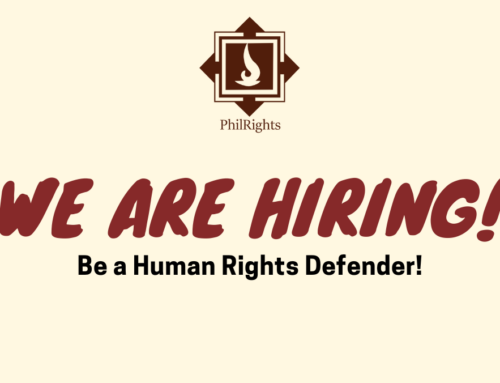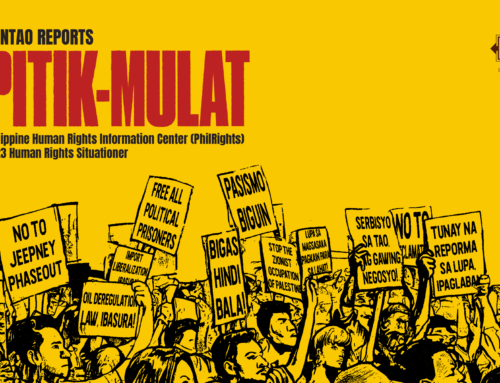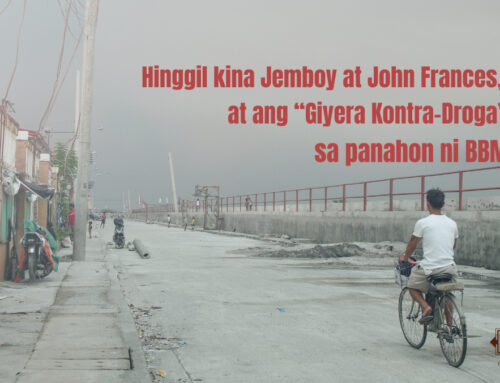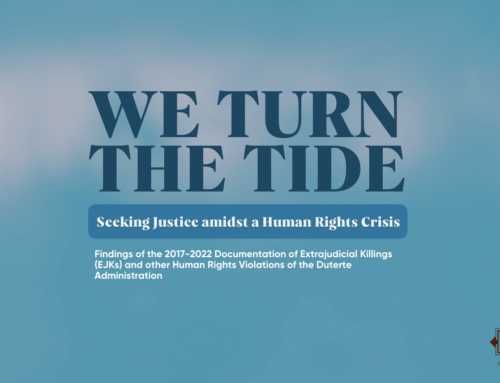Atty. Karen Pimentel Simbulan
The interest of society and the maintenance of good government demand a full discussion of public affairs. Complete liberty to comment on the conduct of public men is a scalpel in the case of free speech. The sharp incision of its probe relieves the abscesses of officialdom. Men in public life may suffer under a hostile and unjust accusation; the wound can be assuaged with the balm of clear conscience.
Justice George A. Malcolm, U.S. v. Bustos, 37 Phil. 731 (1918).
On September 12, 2012, President Benigno Aquino III signed into law Republic Act No. 10175, known as the Cybercrime Prevention Act. This set off alarm bells for media practitioners, civil society groups and regular “netizens” who all use the internet, particularly social media sites like Facebook and Twitter, as well as blog sites, as platforms from which to express their opinions and grievances. The cause of their apprehension is primarily the vague wording of the law, which on its face appeared to transgress a number of rights, among them equal protection, due process, and freedom of speech, that are expressly guaranteed in the 1987 Constitution.
Against the backdrop of recent history, particularly the shared experiences after martial law was declared in 1972, it is easy to understand the people’s clamor for the repeal or substantial amendment of the law, the questionable provisions being reminiscent of the curtailment of free speech and circumvention of due process that occurred under martial rule. Coincidentally, the Cybercrime Prevention Act was passed in the same month that the country commemorated the 40th anniversary of the declaration of martial law by the former dictator, Ferdinand Marcos, leading critics to dub the law “Cyber-Martial law.”
Our Guaranteed Rights
Foremost among the guarantees under the Bill of Rights is that “
Similarly, Article III, Section 4 of the 1987 Constitution, which states that: “[n]o law shall be passed abridging the freedom of speech, or of the press, or the right of the people peaceably to assemble and petition the Government for redress of grievances,” guarantees the right to free speech and free press. In defining these rights, the Supreme Court, in Gonzales v. Commission on Elections,3 held that:
At the very least, free speech and free press may be identified with the liberty to discuss publicly and truthfully any matter of public interest without censorship and punishment. There is to be no previous restraint on the communication of views or subsequent liability whether in libel suits, prosecution for sedition, or action for damages, or contempt proceedings unless there be a clear and present danger of substantive evil that Congress has a right to prevent.
Another fundamental right recognized in the 1987 Constitution is the right to privacy, which was first expressly recognized in our jurisdiction in 1968, when the Supreme Court, in the seminal case Morfe v. Mutuc,4 held thus:
The right to privacy as such is accorded recognition independently of its identification with liberty; in itself, it is fully deserving of constitutional protection. The language of Prof. Emerson is particularly apt: “The concept of limited government has always included the idea that governmental powers stop short of certain intrusions into the personal life of the citizen. This is indeed one of the basic distinctions between absolute and limited government. Ultimate and pervasive control of the individual, in all aspects of his life, is the hallmark of the absolute state. In contrast, a system of limited government safeguards a private sector, which belongs to the individual, firmly distinguishing it from the public sector, which the state can control. Protection of this private sector — protection, in other words, of the dignity and integrity of the individual — has become increasingly important as modern society has developed. All the forces of a technological age — industrialization, urbanization, and organization — operate to narrow the area of privacy and facilitate intrusion into it. In modern terms, the capacity to maintain and support this enclave of private life marks the difference between a democratic and a totalitarian society.”
The right to privacy encompasses “the right of the people to be secure in their persons, houses, papers and effects against unreasonable searches and seizures of whatever nature and for any purpose,”5 as well as the expectation that “[t]he privacy of communication and correspondence shall be inviolable except upon lawful order of the court, or when public safety or order requires otherwise,”6 and that “[t]he liberty of abode and of changing the same within the limits prescribed by law shall not be impaired except upon lawful order of the court.”7
There is also the right of the accused against double jeopardy, contained in Article III, Section 21 of the Constitution, which provides that “[n]o person shall be twice put in jeopardy of punishment for the same offense. If an act is punished by a law and an ordinance, conviction or acquittal under either shall constitute a bar to another prosecution for the same act.”
Admittedly, the rights enshrined in the Bill of Rights are not sacrosanct and can be subject to government regulation so as not to be “injurious to the equal enjoyment of others having equal rights, nor injurious to the rights of the community or society.”8 The State, in the exercise of police power, has the “authority to enact legislation that may interfere with personal liberty or property in order to promote the general welfare.”9 However, the State, in the exercise of this power, may not act arbitrarily or unreasonably,10 nor employ means that are unduly oppressive upon individuals.11
Provisions of the Cybercrime Prevention Act that Contravene the Bill of Rights
One of the most controversial provisions of the Cybercrime Prevention Act is Section 4(c)(4),12 which includes libel committed through a computer system or similar means as one of the cybercrimes punished under the Act. What is particularly alarming by the classification of libel as a cybercrime is that the penalty imposed for the commission of libel is actually increased by one degree if it is committed through, and with the use of information and communication technologies like mobile phones, computers and the internet. In other words, if a person is found guilty of committing libel via the internet (on a blog, via a Facebook post, or on Twitter), or through text messages, the penalty imposed increases from the period of 6 months to 4 years and 2 months, to the higher period of 6 years to 10 years.
Another problematic aspect is that while the Cybercrime Prevention Act employs the same definition of libel found in the Revised Penal Code, it fails to specify who can be held liable for a libelous online publication. Will prosecution be limited to the author of the piece or will it include the publisher of an online newspaper, for example? Similarly, the vagueness that surrounds what constitutes aiding and abetting in the commission of a cybercrime,13 also punishable under the Act, calls into question whether persons who merely repost, share or even like or express agreement with a libelous publication can be held liable under the Act. The increased penalty, together with the vagueness of who exactly can be held liable, together constitute circumstances that would lead people to hesitate to freely exercise their right to free speech for fear of the legal consequences. This is the so-called “chilling effect” that acts as a prior restraint on speech and constitutes a form of censorship, which, in our jurisdiction, is hobbled by the presumption of invalidity.14
Furthermore, Section 6 of the Cybercrime Prevention Act, which provides that all crimes defined by the Revised Penal Code, if committed by, through, and with the use of information and communication technologies, shall be punished with a penalty one degree higher than that provided for by the Revised Penal Code, clearly constitutes a violation of the right to equal protection of laws as there is no rhyme nor reason for two people who commit the same crime to be subject to different penalties based solely on the different means that the crime is committee.
In the same vein, Section 715 also allows for double prosecution of a crime defined under both the Revised Penal Code and the Cybercrime Prevention Act, in clear contravention of the right against double jeopardy.
Equally unsettling is Section 1216 of the Cybercrime Prevention Act, which permits the National Bureau of Investigation (NBI) and the Philippine National Police (PNP), based only on due cause, to collect or record traffic data in real-time without any need for a search warrant. This section further compels service providers to cooperate and assist law enforcement authorities by providing this information. In bypassing the requisite search warrant required under the Constitution, this provision gives the NBI and the PNP the right to scrutinize information relating to a person’s communication, based on the mere standard of “due cause” which is left to the NBI and the PNP’s discretion. In other words, the NBI and the PNP are left to decide if there is due cause for them to obtain this information, making it quite easy for these authorities to conduct fishing expeditions on a mere hunch. This grant of authority is clearly in disregard of our constitutionally-guaranteed right against unreasonable searches and seizures.
More alarmingly, Section 19 of the same Act provides: “[w]hen a computer data is prima facie found to be in violation of the provisions of this Act, the DOJ shall issue an order to restrict or block access to such computer data.” This provision grants the DOJ the power to unilaterally order service providers to block access to material, the so-called “takedown power”, based only on a prima facie finding of a violation of this Act. As in Section 12, it is the DOJ, through the Secretary of the Department of Justice, who is given the authority to make the determination of prima facie violation. Not only is this censorship in its most blatant form, it can be committed without even the benefit of a trial or conviction.
The Way Forward
Critiquing the Cybercrime Prevention Act should not in any way be construed as a condemnation of the rationale behind the passage of this law. Like any tool, the internet can be abused and used in pursuit of criminal aims such as child pornography, human trafficking, identity theft, illegal access to data, and computer fraud. There thus exists a pressing need to pass laws that address these dangers. At the same time, however, such measures should not result in the blanket curtailment of the rights and freedoms guaranteed to the people under the 1987 Constitution such as the right to equal protection and due process, free speech and free press, as well as the right to privacy.
In this regard, the Magna Carta for Philippine Internet Freedom (Magna Carta on Internet Freedom) proposed by Senator Miriam Defensor Santiago is worth examining. What differentiates the Magna Carta on Internet Freedoms from the Cybercrime Prevention Act is that the former takes pains to list down the acts that do not constitute internet libel, such as “expressions of protest against the government,” “expression of dissatisfaction against the government,” and “expressions of dissatisfaction with public figures, political parties, religious groups, associations.” A number of defenses to internet libel are also provided, such as if the content is proven to be true, or if it is made on the basis of reports presumed to be true, or if the content is intended to be humorous or satirical in nature.17 More importantly, a violation of the internet libel provision under the Magna Carta on Internet Freedoms will give rise only to civil liability.18 In this way, the proposed law provides specific safeguards against the chilling effect of the present law, the Cybercrime Prevention Act.
While the Cybercrime Prevention Act violates the right to privacy and the right against unreasonable searches and seizures, the Magna Carta on Internet Freedom guarantees a citizen’s right to security of data by requiring a court order before persons providing internet or data services can be compelled to provide others with access to a person’s private data. A court order is also necessary before websites or networks can be taken down from the internet.
At present, the internet is being heralded as the last bastion of free speech. The ease by which the internet allows people to connect with one another and to express their thoughts and share information provide us, the citizens, with a powerful tool to ensure participation in the democratic process. The internet allows every single one of us to act as journalists, investigators and watchdogs of our government officials, ensuring accountability in real time as we are given the power to broadcast experiences to a live audience that also has the capacity to respond and interact. Any attempt by the government to stifle online expression, criticism or dissent in the name of regulating harmful or illegal activities online must rightfully be met with the clamor that arose with the passage of the Cybercrime Prevention Act.
1 See Silverio v. Court of Appeals, G.R. No. 109979, March 11, 1999; Salonga v. Court of Appeals, 269 SCRA 534; PMI Colleges v. National Labor Relations Commission, 277 SCRA 462; Garment and Textile Export Board v. Court of Appeals, 268 SCRA 258; Legarda v. Court of Appeals, 280 SCRA 642.
2 Commissioner of Customs v. Hypermix Feeds Corporation, G.R. No. 179579, February 1, 2012.
3 137 Phil. 471, 492 (1969).
4 G.R. No. L-20387, January 31, 1968.
5 1987 Constitution, Article III, Section 2.
6 Id., Section 3.
7 Id., Section 6.
8 Primicias v. Fugoso, 80 Phil. 71, 75-76 (1948).
9 Edu v. Ericta, No. L-32096, October 24, 1970, 35 SCRA 481, 487, citing Calalang v. Williams, 70 Phil. 726 (1940).
10 See Philippine Association of Service Exporters, Inc. v. Drilon, G.R. No. 81958, June 30, 1988.
11 Social Justice Society v. Atienza, Jr., G.R. No. 156052, 13 February 2008, 545 SCRA 92, 138.
12 Section 4. Cybercrime Offenses. — The following acts constitute the offense of cybercrime punishable under this Act:
c) Content-related Offenses:
4) Libel. — The unlawful or prohibited acts of libel as defined in Article 355 of the Revised Penal Code, as amended, committed through a computer system or any other similar means which may be devised in the future.
13 Section 5. Other Offenses. — The following acts shall also constitute an offense: (a) Aiding or Abetting in the Commission of Cybercrime. – Any person who willfully abets or aids in the commission of any of the offenses enumerated in this Act shall be held liable.
14 See Iglesia ni Cristo v. CA, 328 Phil. 893, 928 (1996).
15 SEC. 7. Liability under Other Laws. — A prosecution under this Act shall be without prejudice to any liability for violation of any provision of the Revised Penal Code, as amended, or special laws.
16 Section 12. Real-Time Collection of Traffic Data. — Law enforcement authorities, with due cause, shall be authorized to collect or record by technical or electronic means traffic data in real-time associated with specified communications transmitted by means of a computer system.
Traffic data refer only to the communication’s origin, destination, route, time, date, size, duration, or type of underlying service, but not content, nor identities.
17 Proposed Magna Carta for Internet Freedoms, Section 33.
18 Ibid, Section 36.









